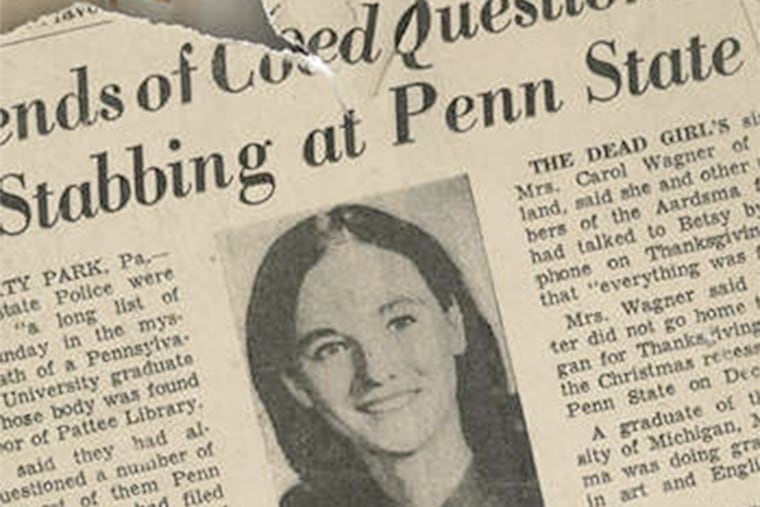Book review: 'Murder in the Stacks' is the definitive treatment of Penn State cold case
For more than 45 years, the unsolved murder of Penn State graduate student Betsy Aardsma has haunted the university community in State College.

For more than 45 years, the unsolved murder of Penn State graduate student Betsy Aardsma has haunted the university community in State College.
Late on the Friday of Thanksgiving weekend, 1969, she was researching an English paper in the dimly lit stacks of the Pattee Library when others nearby heard a brief commotion. They found Aardsma, 22, collapsed in a narrow aisle.
A small blade was thrust through her left breast and into her heart. But just as there had been no cry for help, there was no obvious wound, and it wasn't until an hour later that authorities discovered this was no sudden death from natural causes. By then, the crime scene had been trampled, the floor mopped, books put back on shelves. State police assigned 40 troopers to the case, but the investigation never overcame that opening setback.
The mystery has attracted writers for years, but it has remained for Harrisburg author David DeKok to do the definitive work. Murder in the Stacks is a masterful piece of research and writing. DeKok tracked down old boyfriends of Aardsma's, school chums, and others to profile her in vivid detail. He also won the cooperation of the lead investigator, who spent years on the case before retiring.
DeKok was drawn to the story from having grown up a few years behind Aardsma in Holland, Mich., where the Dutch Calvinism of its immigrant founders was still a potent cultural force in the 1960s. Aardsma, he writes, was gradually breaking away from her conservative roots as she encountered campus movements for women's rights and protests against the Vietnam War. She came to Penn State partly to get far away from a series of coed killings then rocking southeastern Michigan.
Who killed Betsy Aardsma? DeKok has a strong suspect: a fellow graduate student who had tried to befriend her, only to be rebuffed (he was "a creep," she told her family). He was Richard Haefner, of Lancaster, whose promising career in geology was wrecked by repeated allegations of pedophilia. He died of a heart attack in 2002 while doing geologic field research. "He pursued boys for sex with the same abandon that he pursued unique mineral specimens," DeKok writes. "And he wrecked people's lives with frivolous lawsuits. In so many ways, he was a monster."
DeKok marshals considerable evidence that Haefner was the killer. He was known to carry a small, homemade knife with an awl-like handle. He was capable of explosive rages against women. What began as an innocent encounter in a Delaware liquor store parking lot in 1998 ended with him yanking a woman out of her SUV and beating her badly. After he was convicted, he turned around and sued the victim for damages in federal court.
Most damning of all was an incident apparently never reported to police. About an hour after the murder, Haefner appeared in an agitated state at the front door of his faculty adviser, asking whether there had been anything in the news about a woman being killed on the Penn State campus. This faculty member kept silent until seven years later, when he confided it to his dean, who relayed the story to the university's outside general counsel. There it apparently stayed.
Soon the story began to fade. Betsy Aardsma "had no family in the state to pressure legislators for action, to complain to the state police regularly about the lack of an arrest, or simply to be angry," DeKok writes. With this book, the victim's story at last gets a thorough and deeply sympathetic telling.
Murder in the Stacks
Penn State, Betsy Aardsma, and the Killer Who Got Away
nolead begins By David DeKok
Globe Pequot Press. 437 pages. $18.95
nolead ends nolead begins